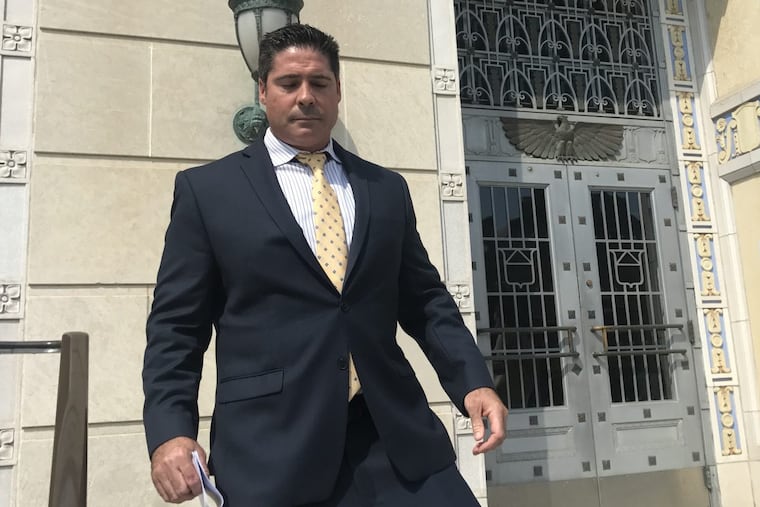South Jersey doctor pleads guilty for role in $25M health-care fraud
"Dr. Gaffney sold phony prescriptions for unnecessary medications to patients he never examined," prosecutors said.

A South Jersey doctor pleaded guilty Friday to writing phony prescriptions for patients he never saw in a $25 million health-care fraud scheme that prosecutors say targeted teachers, firefighters, and police officers.
John L. Gaffney, 55, of Linwood, pleaded guilty before U.S. District Judge Robert B. Kugler in Camden to a count of conspiracy to commit health-care fraud. He faces up to 10 years in prison when he is sentenced Jan. 5, 2018.
The plea was the latest in what is expected to be a far-reaching case involving federal and state grand juries, in which municipal employees with public health benefits were recruited. The Margate, Ventnor, and Atlantic City municipal governments were subpoenaed by a federal grand jury over the summer for lists of city employees with state health benefits.
"Dr. Gaffney sold phony prescriptions for unnecessary medications to patients he never examined as part of a sophisticated scheme to defraud a prescription benefits program available to New Jersey state and municipal employees," acting U.S. Attorney William E. Fitzpatrick said in a statement. "In an era when many Americans work hard to maintain affordable health insurance for their families, Dr. Gaffney and his conspirators criminally exploited the health-care system and left New Jersey taxpayers on the hook for approximately $25 million in losses."
In court Friday, Gaffney, who specializes in osteopathic medicine and has an office in Margate, admitted to signing more than 200 fake prescriptions, mainly for public employees. The prescriptions were used by those with public health benefits to fraudulently obtain medically unnecessary compounded vitamins, pain cream, scar cream, libido cream, and anti-fungal cream.
"Did you know that what you were doing was wrong and against the law?" Kugler asked Gaffney.
"Yes, your honor," responded Gaffney.
The judge released Gaffney on $200,000 bail and required him to surrender his passport.
The scheme has been the subject of relentless rumors and anxiety in Shore towns worried about the impact on their public safety departments and schools.
Five others, including two pharmaceutical representatives, a retired Atlantic City firefighter, and Matthew Tedesco, 42, of Linwood, the admitted leader of the scheme, have pleaded guilty and await sentencing. Tedesco admitted to receiving more than $11 million from an out-of-state compounding pharmacy, a portion of which he passed along to co-conspirators, according to his guilty plea in July.
The pharmacy involved in the charges outlined by the U.S. Attorney's Office was paid more than $50 million by the health plan's pharmacy benefits administrator for prescriptions mailed to individuals in New Jersey during 2015 and 2016. New Jersey was billed for those costs, the U.S. Attorney's Office said.
Those compounded-drug orders yielded the out-of-state pharmacy, which authorities have not named, payments of upward of $10,000 a month from insurance companies. The money then was divided up among Tedesco and co-conspirators in a series of rewards and kickbacks in the form of a percentage of each prescription filled.
Compounding is a practice in which "a licensed pharmacist combines, mixes or alters ingredients of one or more drugs in response to a prescription to create a medication tailored to the medical needs of an individual patient." Compounds are typically used when a patient is allergic to an ingredient in a standard drug, authorities said.
The government alleges that Gaffney and other doctors involved agreed to write prescriptions for expensive creams that had been filled out by Tedesco and others without ever directly examining the recipients, or determining whether there was an appropriate diagnosis. Tedesco would persuade people to obtain prescription compounded drugs "without any evaluation by a medical professional," the government says.
Once they had recruited an employee, Tedesco and others would allegedly obtain the employee's insurance information and fill out a prescription for compounding. They would select the compounded medications that paid the most and order 12 months of refills, the government said. Tedesco and others gave money and other benefits to doctors who signed the prescriptions and individuals who agreed to receive the medication, the government said.
The guilty pleas, as detailed by Assistant U.S. Attorney David Walk, cover the period from January 2015 to April 2016.
As part of Friday's plea, Gaffney agreed to pay nearly $25 million in restitution and forfeit $25,000. His attorney said Gaffney received $25,000 in cash and gifts, including wine and dinners, for his role in the scheme.
Gaffney left the courtroom without commenting to reporters. Asked why his client got involved in the scheme, his attorney, Michael J. Engle, replied, "Pure stupidity."
According to his biography, Gaffney graduated from Philadelphia College of Osteopathic Medicine in 1988.
"It really was thoughtless, careless, trying to do a favor for individuals he considered to be friends," Engle said. "He was very remorseful for what obviously were his thoughtless acts in this scenario. The only silver lining here is that fortunately, no patient or individual who was prescribed any of these creams or other items suffered any negative consequences. As a doctor who does care for his patients, that was one of the most important things."